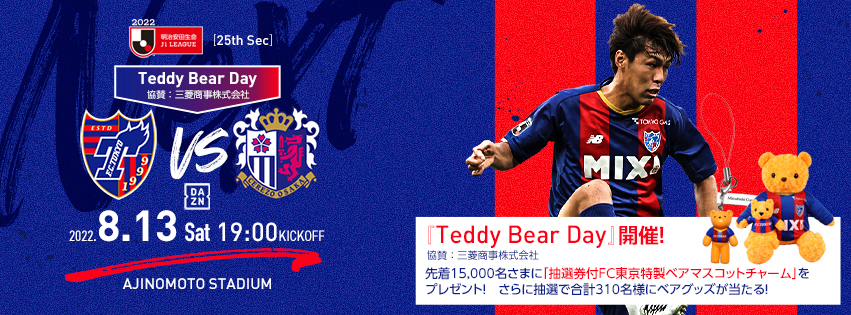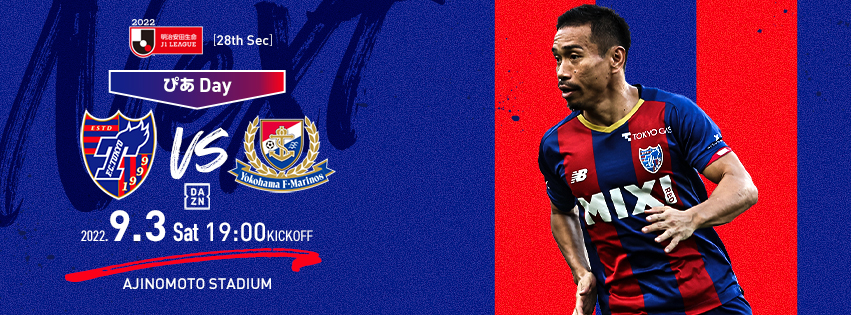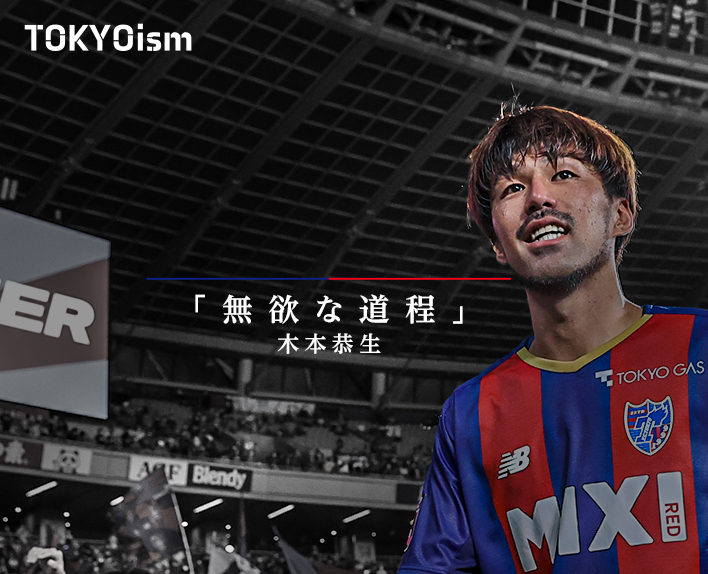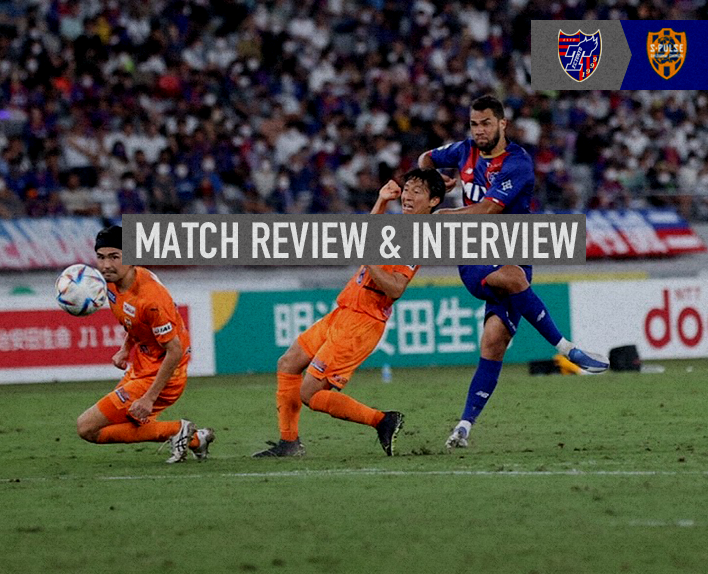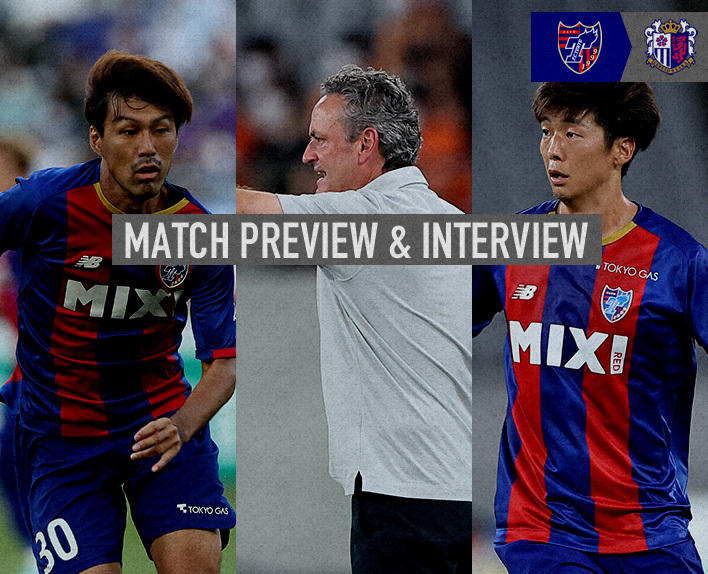This request was for a column related to Yasuki KIMOTO's roots. Born in Fuji City, Shizuoka Prefecture, he attended the prestigious Shizuoka Gakuen for junior high and high school, and after graduating from Fukuoka University, he turned professional. His background suggests he is a true soccer boy. However, during the interview, which began with a knee-to-knee conversation, words that were far removed from his profile emerged.
"I think the reason I've come this far is that I don't have any strange pride or desires. The national team? I've never thought about that even once. I can't say I've worked harder than others; I haven't slacked off, but I've just been steadily doing what I can."
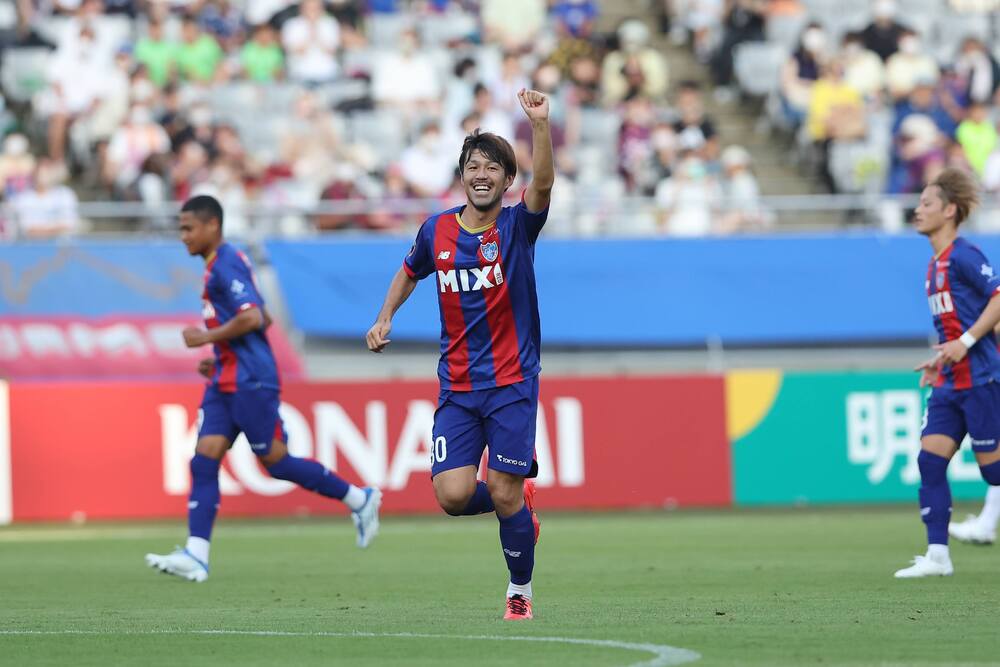
As the comments continued to be so selfless, I couldn't help but blurt out, "What a rare type." I guess that made him feel awkward, so Kimoto said.
"I have always thought that my personality doesn't fit in this world. My high school coach also told me that I don't have the personality for a professional player."
This is how the beginning of that soccer life was.
Two different environments that became a turning point
"Originally, I wanted to play baseball"
Influenced by my father who played baseball, I liked playing catch more than juggling. However, my older brother, who is two years older, was more interested in soccer than baseball. As the middle child of three siblings, the obedient second son reluctantly started kicking the ball "to avoid troubling my parents." In the first grade of elementary school, I was somewhat forced into the Fujimidai Soccer Sports Youth Club, where initially there were no classmates, and I laugh about how "there was a long period when I practiced secretly for a year." From the following year, as classmates began to gather little by little, I started to join the practices.
The initial position was a forward, as it was fun to score goals, but there were no particular preferences, and I also played in midfield for the selection team.
"It's the same now, but I will do my best in the position I am assigned. My stance of being okay with any position hasn't changed."
Following in his brother's footsteps, he advances to the prestigious Shizuoka Gakuen Junior High School, which offers integrated junior and senior high school education. His parents told him, "Since you got into school through soccer, you should continue until high school." He openly reveals his feelings from that time.
"Did you ever think about becoming a professional player during high school? Not at all. At first, I was thinking of quitting soccer in high school. There were players like Ryota OSHIMA from Kawasaki Frontale and my classmates who were participating in training with J-League clubs, and their level was really high. I thought it was impossible for me, so I never considered it as a goal."
The turning point that led Kimoto to turn professional came in two instances. The first occurred during the summer of his second year in high school. He was promoted to the top team of Shizuoka Gakuen High School as a defensive midfielder, but there were players like Ryota OSHIMA and Arisuke Hoshino (who retired from professional football at Gainare Tottori in 2019) one year above him, which limited his playing opportunities. Therefore, he was advised to convert to center-back due to the many injuries and the lack of players in that position. He accepted this suggestion without hesitation.
"I didn't say I didn't want to, I just felt like I would do it. I was able to utilize my footwork skills, and I happened to like heading practice. Moreover, Shigaku was unique. I wasn't particularly told about defense; even as a center-back, if I outmaneuvered the opposing forward, I was praised. Even if I lost the ball and we conceded a goal, it was said that it was good that I challenged myself. I found that interesting. If I had been told too much, I might have shrunk back. So I think it was a good environment."
The water of such traditional schools suited him well. He was able to freely develop his skills and secured a starting position as a center-back in his third year of high school. He contributed to the team reaching the finals in the National High School Comprehensive Sports Festival in the summer, and the following year, he advanced to university on a soccer scholarship. He chose Fukuoka University, a powerhouse in Kyushu, as his school. The opportunity came from a line from Coach Masahiro Inui, who jokingly said, "Honestly, I feel a bit deceived," and continued with a wry smile.
"Mr. Inui told me that we are aiming for Barcelona and that we need players who can connect from the back like you. But when I actually went there, the ball was flying around in the air. At that moment, I really thought I had been deceived. However, I believe that choice ultimately turned out to be a good one."
When I told Coach Inui about that, he said, "I don't remember the exact words of my pitch back then. He came on board without hesitation, so I was really glad he came," and he chuckled.
Unintentionally, this decision will become the second turning point that opens the path to becoming a professional. A soccer style that is the complete opposite of what I had imagined... a drastically changed living environment away from home... within that context――.
"Honestly, I was confused"
At the beginning of enrollment, it was a series of struggles. Coach Inui also mentioned that time, saying, "There is a story that all the surrounding coaches remembered."
"I guess there were worries and confusion. Whenever he came to practice, he always had a really gloomy face. So, I kept telling Kimoto, 'Fix that gloomy face.' Our expectations were at 100 percent, but he always looked downcast. So, I told him to somehow change that face before playing soccer. It lasted for about six months, though."
He became a member of the top team, but it took time for him to establish himself as a key player. He struggled with the discrepancies from the free and attacking style he had cultivated, and it must have been a year filled with challenges. However, while other players were left behind, suffering from the gap in style compared to their high school days, Kimoto gradually began to adapt to the style of Fukuoka University. Kimoto had the willingness to listen and a learning attitude to break free from his days of anguish.
"When I was a first-year student, I was scolded every day, and at that time, I really thought about it every day. I thought that if I just did what I learned at Shigaku, I wouldn't be able to play in matches and that it would end like this. But while I was struggling, I realized that I had to keep the good things I had learned so far while also adapting to Fukuoka University's soccer. That's how I was able to change little by little. I think there were players whose pride got in the way and couldn't accept it. I don't know if it's good or bad, but I had no pride."
The only wish of a man who remains calm at all times
The strength accumulated over a year will blossom in the second year of university. He can play at a high level as both a center back and a defensive midfielder, with precise footwork. Additionally, his ability to adapt to any style of soccer has reached a moment of fruition. In his second year, he emerged as a key player on the main stage and was selected for the All Japan University Selection, so J-League scouts would not overlook Kimoto. In the winter of his second year, he was approached by a scout from Cerezo Osaka, who said, "We will be watching your future performances."
"If I work hard for the next two years, I've started to gradually become aware of becoming a professional."
Even so, without stretching too far, I will steadily draw a growth curve that rises smoothly. As a key player, I continued to excel for the next two years. In my fourth year, I won the Kyushu League undefeated and received the MVP award at the Denso Challenge Cup. Then, I officially received an acquisition offer from C Osaka. Coach Inui also smiled at my growth.
"I was originally the type to underestimate myself, saying things like, 'I'm not there yet,' and being overly humble. I was needed and became a key player in just two years. It was a rare story in the history of Fukudai that a player who was told to 'fix that gloomy face' would win MVP at the Denso Cup. If I hadn't come to the university, I might have been a talent that would never see the light of day. I came to Fukudai, played in matches, and adapted to strength and speed. Ultimately, I think I became a player suited for the professional league. Even now, I wouldn't boast, saying, 'I am a pro.' I've never heard him tell a bragging story" (Coach Inui).
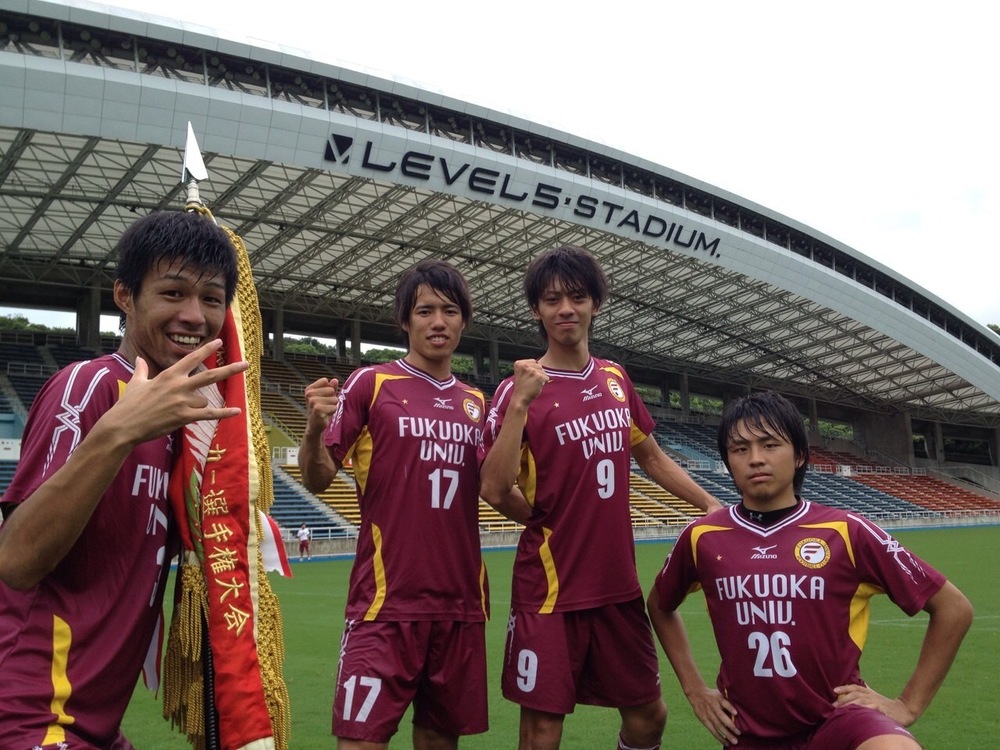
Photo provided by: Yasuki KIMOTO
Fukuoka University has produced a number of sharp and uniquely talented players, including Kensuke NAGAI. Among them, his seemingly selfless personality is also a remarkable trait. His mentor, who has watched over him for four years, describes this charm.
"There is no big jumping or shrinking. With a poker face, it seems like nothing is on his mind, but in reality, he is thinking. Players behind him are difficult to use when there are fluctuations. To continue competing in J1, one must have stability both physically and mentally. To compete against faster and larger foreign players, one must have smart positioning to cope. An 18-year-old's evaluation is of no use. One must build oneself from what is visible. Such a type is rare. If unconventional attacks are Nagai's added value, then his stability is his added value. Before I knew it, among the players we produced, Kimoto's achievements became number one. Perhaps it was only during the first six months after entering university that he fluctuated greatly. After that, he carefully searched for ways to survive and found answers. I have never demanded that Kimoto play in a certain way."
It has been proven by Kimoto himself. "Even during times when I couldn't play in matches, I was able to practice with a calm mind without getting discouraged. I think that's part of my character." Saying this, he has continued to adapt to any coach or tactics after turning professional. He has won titles both at C Osaka and Nagoya. To achieve that, Kimoto's remarkably stable play, which you can rely on, was indispensable.
And although I did not hope for much, there is one thing I want to achieve.
"I have won the Levain Cup twice and the Emperor's Cup, but I have never won the league championship. Winning titles is incredibly joyful and becomes a lifelong memory. After winning those two titles, I started to want to win the league title. I want to level up even more for that purpose."
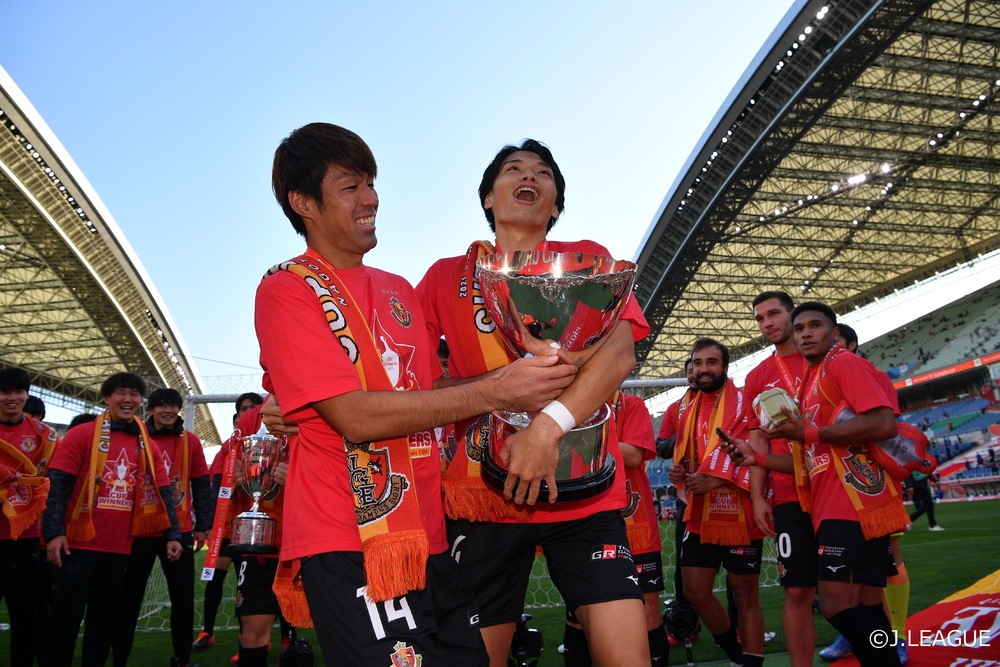
So what I need right now is――.
"I think it's about leadership. The coach tells us to express our emotions. There are many veteran players, but it's not enough to just follow them. It's also important to unify the team. Everyone has their own characteristics, so I want to think about how to lead the team in a way that suits me."
It suddenly made sense. "That's unusual." There aren't many players who can remain so calm and composed without any waves. The collection of titles he has won has always shown him in the background, barely noticeable. Yasuki KIMOTO should soon become the main player of the team; his journey of building an unwavering self by having the desire of being selfless made me think so.
Text by Kohei Baba (Football Writer)
